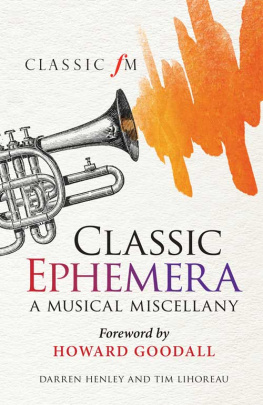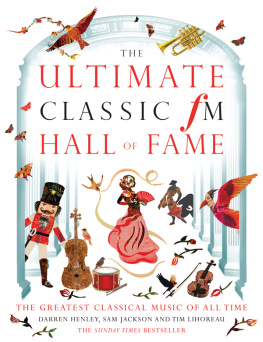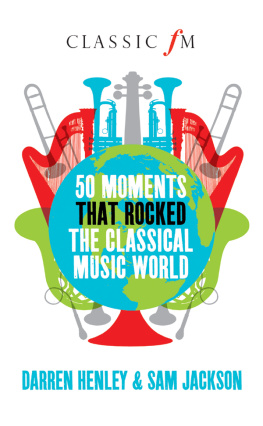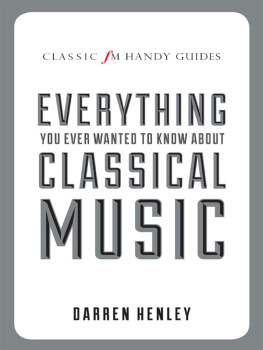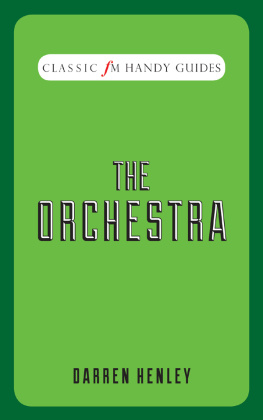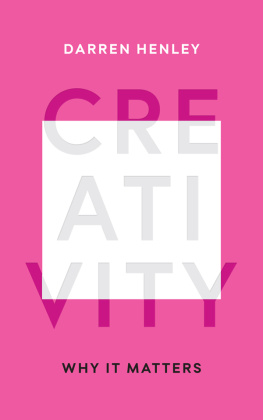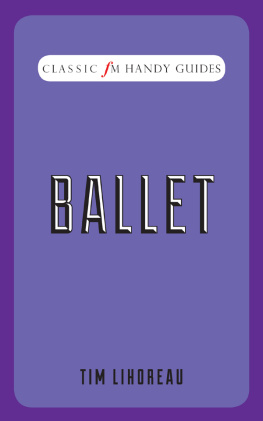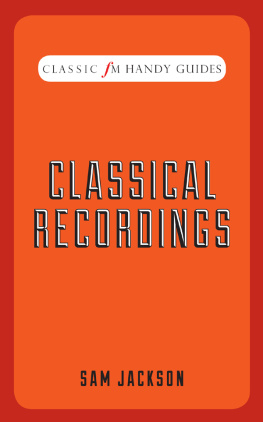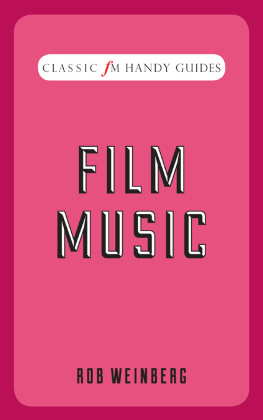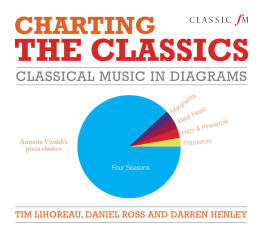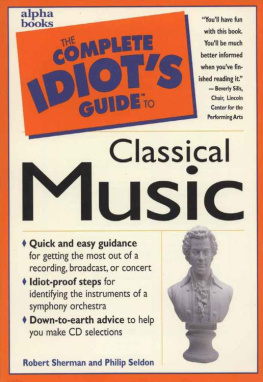CLASSIC EPHEMERA
CLASSIC EPHEMERA
Compiled by
Darren Henley and Tim Lihoreau
First published 2009 by Elliott and Thompson Limited
27 John Street, London WC1N 2BX
www.eandtbooks.com
ISBN 978-1-9040-2781-2
Copyright Darren Henley and Tim Lihoreau
The right of the authors to be identified as the authors of
this work has been asserted by them in accordance with the
Copyright, Designs and Patents Act 1988.
The Classic FM logo is a registered trademark of Classic FM Ltd
All rights reserved. No part of this publication may be reproduced, stored in
or introduced into a retrieval system, or transmitted, in any form, or by any
means (electronic, mechanical, photocopying, recording or otherwise) without
the prior written permission of the publisher. Any person who does any
unauthorized act in relation to this publication may be liable to criminal
prosecution and civil claims for damages.
9 8 7 6 5
A CIP catalogue record for this book is available from the British Library.
Printed and bound in the UK by CPI Mackays, Chatham ME5 8TD
FOREWORD
by Howard Goodall
I was invited to join the Classic FM team in the spring of 2008, as presenter of a weekly Saturday afternoon show and, in due course, as Composer-in-Residence. What has taken me by surprise in my year of presenting Howard Goodall On each week (for which I choose and research my own music choices) is how much I would learn in the process.
I thought I knew my classical music trivia, to a point, but I have been quite taken aback at the wealth of intriguing minutiae that I have uncovered along the way, nuggets of knowledge that definitely werent on the syllabus of my university music course. It turns out that Classic FM has been unearthing unexpected facts the kind that bring a smile to your face all along, and I am merely Johnny-come-lately on a quest others have been pursuing for many years, especially Tim Lihoreau and Darren Henley, the authors of this book. It has been a challenge for me to reveal information about composers that even they didnt know. It is possible. I note, for instance, with undisguised glee that in the composers who share the same birthday list in this book Tim and Darren have omitted one remarkable double-birthday in the field of musical theatre: Stephen Sondheim and Andrew Lloyd Webber (22nd March, 18 years apart). I share mine with jazz legend Miles Davis, but I wouldnt dare suggest putting my own in amongst the existing illustrious list!
Discovering that Russian composer Alexander Scriabin died from a shaving cut, for example, in my programme about sticky endings or that Armenian composer Khachaturian (he of the Sabre Dance) was actually a trained biologist, a fact brought to the surface in my programme on music and science, has given me immense satisfaction, and Im not embarrassed to admit it.
This collection, to which I feel I may have occasionally but modestly contributed as fellow-traveller, is a kind of QI for music. We composers turn out to upset many preconceptions about us as tormented, ill-tempered loners, battling with an exasperated landlord, a long-suffering patron, or an inebriated conductor (though all of these confrontations have also occurred). We have foibles. We develop strange superstitions and routines and many of us contrary to the popular view of us as obsessively single-minded have other interests, hobbies and fascinations. Apart from Borodins professional achievements as a research chemist, Rossinis eminence as a chef de cuisine or Paderewskis becoming Prime Minister of Poland, theres Gerald Finzi, an English composer of the early 20th century, who was a serious apple grower and cider-brewer: indeed, without his extensive orchards, some rare varieties of British apple would otherwise have become extinct by now. This is what one might call core repertoire.
In a written answer to a question from a reader of the Soviet newspaper Pravda, composer Prokofiev once actually worked out the mathematical equation that would reveal when composers had exhausted all possible combinations of notes in their works. I love this kind of anecdote; it tells me much more about Prokofiev than that he went with thousands of others to study at the St. Petersburg Conservatoire. His death was also on the same day as Stalins, going virtually unreported as a consequence, in case you were interested. If the word anorak is lurking at the back of your diaphragm on hearing these pieces of research, resist its lure and choke it back, since, surely, lifes richness is captured in the subtle details of the tapestry.
If on the other hand you are still ruminating over that calculation of Prokofievs, then admit it, youre hooked, arent you? Well, it starts with the bewildering proposition that each melody of 8 notes is made up of 6 million alternatives. I am hoping that 70 years since he wrote that, there are still a few left for the likes of me. If not, theres always that old cider press in the barn
INTRODUCTION
Since we first turned on our transmitters, all of us at Classic FM have believed that classical music should be a part of everyones life. If you already listen to the music we play every day and you want to know more about it, then youve come to the right place.
This may not be the biggest book about classical music that youll be able to find. But what it lacks in size, it makes up for in facts, stories and, most important of all, recommendations for great music to listen to.
As we put together our radio programmes, we often discover fascinating facts and titillating titbits about the world of classical music. After many years of collecting this information, weve gathered it all together here in one single book, which spans composer biographies, instrument profiles, general trivia, lengthy lists and quotable sayings. This is the result.
So if youre hoping to uncover the killer fact to spice up your after-dinner conversation; if you want to dazzle your friends with your knowledge of the stories behind the greatest classical music; or if, like us, youre simply an acquirer of trivia, we hope there will be something for you in the next 180 or so pages.
If you havent listened to Classic FM yet, then hopefully this book will well and truly whet your appetite, as well as answering some of the questions about classical music that youve always wanted to ask.
Darren Henley
Tim Lihoreau
A WORD ABOUT CLASSIC FM
Classic FM is the UKs only 100% classical music radio station. Since we began broadcasting in September 1992, the station has brought classical music to millions of people across the UK. If youve yet to discover for yourself the delights of being able to listen to classical music 24 hours a day, you can find Classic FM on 100-102 FM, on DAB Digital Radio, online at www.classicfm.com , on Sky channel 0106 and on Virgin Media channel 922.
Classic FM Magazine is published monthly, containing full details of the stations programming, as well as the latest news and interviews from the world of classical music. A free CD accompanies each months magazine, which is available from most newsagents.
Among Classic FMs many CD releases is a new range exclusively available from HMV. The Classic FM Full Works series provides top quality recordings of many of the most popular classical works, played in full by world famous musicians. Priced at just 5.99, these CDs are perfect for both the dedicated collector and for those who are just discovering classical music. You can find out more at www.classicfm.com/fullworks .
Classic FM works particularly closely with five orchestras around the UK, with the aim of encouraging new listeners to enjoy the power and passion of hearing a live orchestra playing in the concert hall. Check the stations website to find out if the Royal Scottish National Orchestra, Northern Sinfonia, the Royal Liverpool Philharmonic Orchestra, the Philharmonia Orchestra or the London Symphony Orchestra are performing near you.
Next page
